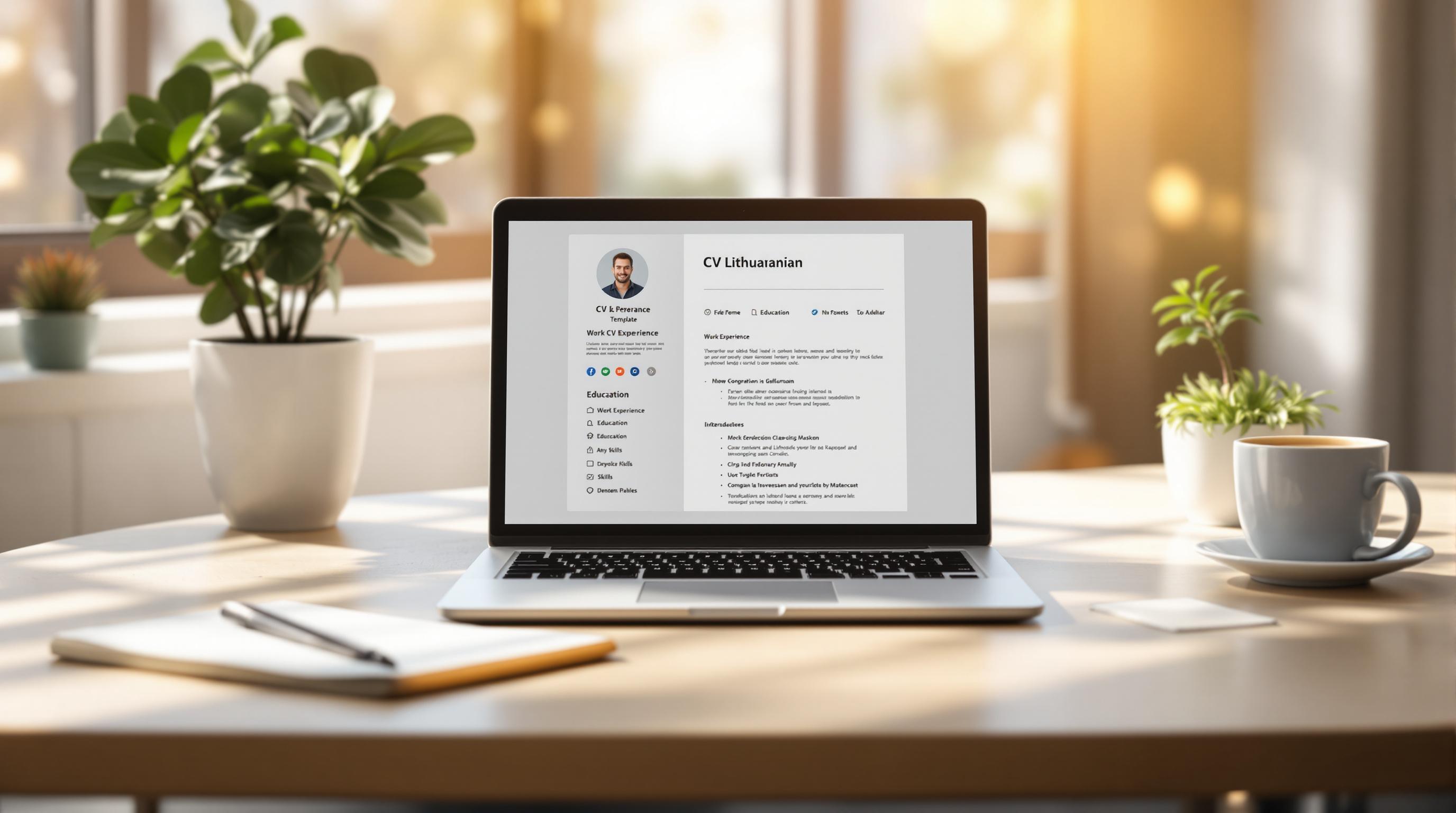- Visa Options: Choose from the National D Visa (short-term), EU Blue Card (highly skilled), ICT Permit (corporate transfers), or Long-term Work Permit (extended employment).
- Costs: Work permits cost €300. Visa fees range from €120 (standard) to €240 (urgent).
- Eligibility:
- Job offer from a Lithuanian employer.
- Valid passport, health insurance, and proof of qualifications.
- Salary thresholds vary by visa type (e.g., 1.5x average salary for EU Blue Card).
- Processing Times: Applications take 7 to 90 days, depending on the visa type.
- Special Perks:
- Fast-track options for high-demand fields like IT and engineering.
- Family reunification benefits for certain visa holders.
Quick Comparison
| Visa Type | Duration | Key Benefits | Processing Time | Cost |
|---|---|---|---|---|
| National D Visa | Short-term | Quick entry for temporary work | 15 days | €120 |
| EU Blue Card | Up to 3 years | Family reunification, EU mobility | 30–90 days | €300 |
| ICT Permit | Up to 3 years | For corporate transfers | 30 days | €300 |
| Long-term Work Permit | 2+ years | Employer flexibility, social benefits | 7–15 days | €300 |
Lithuania's updated 2025 visa policies make it easier for skilled professionals to relocate. Start planning your move today!
Work Visa Categories
Lithuania offers several work visa options tailored to different professional needs, whether you're planning a short-term assignment or a long-term career.
National D Visa
The National D Visa is ideal for short-term work in Lithuania. To apply, you'll need:
The processing time is usually 15 working days, making it a quick way to enter the Lithuanian job market. However, this visa is tied to your current employer, so switching jobs will require a new application [3].
EU Blue Card
The EU Blue Card is designed for highly skilled professionals and comes with several perks:
| Feature | Details |
|---|---|
| Residence Permit | Valid for up to 3 years, with renewal options |
| Family Benefits | Immediate family reunification |
| EU Mobility | Travel to other EU countries after 18 months |
| Processing Time | Fast-track application, typically 30 days |
To qualify, you must have a job offer with a salary at least 1.5 times the average gross annual salary in Lithuania [2].
ICT Work Permit
The Intra-Corporate Transfer (ICT) permit is aimed at staff transfers within multinational companies. Key features include:
- Eligibility for managers and specialists, with transfers allowed for up to 3 years
- Family members can join the permit holder [4]
Your employer must initiate the application, providing evidence of the corporate relationship and your role.
Long-term Work Permit
For extended employment, the Long-term Work Permit works alongside a Temporary Residence Permit (TRP). Benefits include:
- Initial validity of two years, with renewal options
- Flexibility to change employers after the first year
- Access to social benefits and healthcare [1][2]
The standard application fee is €120, while urgent processing costs €240 [6].
Recruitment agencies like Alliance for Recruitment and Manpower Lithuania can assist in selecting the best visa option for your circumstances [3].
Next, we’ll break down who qualifies for each visa and the specific requirements involved.
Who Can Apply
Understanding who qualifies for a work visa in Lithuania is essential. Your eligibility depends on factors like your nationality, qualifications, and the visa type you’re applying for.
Basic Requirements
To work in Lithuania, foreign professionals must meet these key conditions:
- A valid passport with at least six months of validity
- A formal job offer from an employer based in Lithuania
- Proof of relevant qualifications and work experience
- Valid health insurance
- Enough funds to cover your stay
Note: Starting September 1, 2024, Ukrainian nationals without temporary protection must obtain a residence permit before they can work in Lithuania.
Requirements by Visa Type
Each visa category has its own set of criteria:
| Visa Type | Key Requirements | Salary Threshold |
|---|---|---|
| EU Blue Card | Master’s degree or 5 years of experience | 1.5x the average gross salary |
| National D Visa | Work permit and employer mediation | Standard wage |
| ICT Permit | 3+ months of seniority in home company | Company-specific |
| Long-term Work Permit | Approval of labor market test | Compliance with minimum wage |
For jobs on Lithuania’s shortage list, the salary threshold for the EU Blue Card drops to 1.2 times the average salary [2].
Special Cases
Certain groups benefit from simplified procedures:
No Work Permits Needed:
- Citizens of EU/EEA member states or Switzerland
- Permanent residents of Lithuania
- Family members of Lithuanian citizens
- Professionals in shortage occupations
Fast-Track Processing:
- Start-up founders
- Company directors owning over one-third of shares
- ICT executives with specialized expertise
Lithuania has set aside 40,250 quotas for high-demand roles in 2024, making it easier for skilled professionals in these fields to get work authorization [1]. For shortage occupations like IT, engineering, and healthcare, employers don’t need to pass labor market tests, streamlining the process [1][2].
Once you determine you’re eligible, the next step is gathering the required documents and submitting your application.
How to Apply
Securing a Lithuanian work visa requires attention to detail and following the official steps. Here's a clear breakdown of what you need to do.
Document Checklist
Before you start your application, make sure you have these documents ready:
- A valid passport (at least 6 months validity with 2 blank pages)
- A completed visa application form
- A mediation letter from your Lithuanian employer
- An original work permit from the Lithuanian Labour Exchange
- Proof of your qualifications and work experience
- Valid health insurance
- Bank statements showing adequate funds
- Recent passport-size photos
- Proof of accommodation in Lithuania
- Any documents not in Lithuanian or English must be professionally translated and notarized
Application Methods
The process includes two main steps:
- Work Permit: Your employer handles this through the Lithuanian Labour Exchange, submitting your contract, company registration, and qualification documents.
- Visa Application: You can apply via the MIGRIS portal, at a Lithuanian embassy, or through an authorized visa center.
Time and Cost
Here’s an overview of processing times and fees based on visa type:
| Visa Category | Processing Time | Application Fee | Priority Processing |
|---|---|---|---|
| Standard Work Permit | 7-15 business days | €300 | Not available |
| EU Blue Card | 30-90 days | €300 | Available (+€200) |
| ICT Permit | 30 days | €300 | Available (+€200) |
| National D Visa | 15 working days | €120 | Available (+€150) |
Helpful Tips: Start your application at least 3 months before your planned start date. Using the MIGRIS portal can speed up the process, and you can track your application status online. Recruitment agencies like Alliance for Recruitment or Baltic Assist can assist if needed. Keep digital copies of all your documents for easy reference.
Lithuania has set aside 24,830 work permits for non-EU workers in 2025 [5]. Timing your application carefully is important, especially if you’re in a high-demand field.
While the process is manageable, challenges like language barriers or delays might come up. We'll cover how to handle these in the next section.
sbb-itb-447d166
Problems and Solutions
Applying for a Lithuanian work visa can come with its fair share of challenges. Here's how to tackle some of the most common issues you might face.
Language Barriers and Qualifications
If your documents are not in Lithuanian or English, you'll need certified translations. Agencies like Vertimo Namai can handle this for you. For qualifications earned outside the EU, validation through SKVC is required. This process can take anywhere from 2 weeks (express service) to up to 3 months for full recognition, with fees starting at €120.
For professions like healthcare or engineering, additional certifications from relevant professional bodies are necessary. Reach out to the appropriate Lithuanian professional association early to understand their specific requirements.
Handling Delays
Administrative delays are a common hurdle, but there are ways to mitigate them. Use the MIGRIS portal for your application, respond quickly to any document requests, and keep digital copies of everything you submit. Regularly check your application status online to stay updated.
If delays persist, you can contact the Migration Information Center's hotline at +370 5 271 7112 for guidance.
Preparation and organization can go a long way in minimizing these frustrations.
Practical Application Tips
Here are a few tips to make the application process smoother:
- Schedule medical exams at approved centers that provide results in English.
- Ensure your financial documents clearly demonstrate stability.
- Opt for priority processing if your case is time-sensitive.
- Keep your employer informed about any issues or updates.
For more complex cases or specific challenges, immigration law firms like SORAINEN or TGS Baltic offer expert consultations, starting at €150 per hour.
Additionally, the Migration Department provides online consultations every Tuesday and Thursday from 14:00 to 16:00 (Vilnius time). You can book a session through the MIGRIS portal, but make sure to do so at least 48 hours in advance.
After Arrival Steps
Local Registration
After you arrive, make sure to register your residence within one month at your local municipality office (seniūnija). You’ll need the following:
- A valid passport
- Work permit documentation
- Rental agreement or property ownership papers
- A completed registration form (available at the office)
The process usually takes 3–5 business days, though it can vary depending on the municipality. If you’re in Vilnius, it’s best to schedule an appointment through www.vilnius.lt to avoid long waits.
Getting Health Insurance
Health insurance is required for everyone. You can choose from these main options:
| Insurance Type | Coverage | Monthly Cost | Processing Time |
|---|---|---|---|
| State Insurance (CHIF) | Basic healthcare services | 6.98% of your salary | 5–7 working days |
| Private Insurance | Broader coverage | €50–150 | 1–2 working days |
| Employer-Provided | Varies by employer | Covered by company | Immediate |
Private providers like Compensa and IF Insurance are popular choices.
Support Services
The International House Vilnius (located at Konstitucijos pr. 3) offers free consultations, integration assistance, networking events, and language course recommendations.
For job seekers, the Lithuanian Labour Exchange provides career counseling and access to a large job portal at www.uzt.lt.
If you’re looking to learn the language, many employers include language training in relocation packages. Schools like the Vilnius Lithuanian Language Centre also offer courses tailored for professionals.
To build connections, consider joining networks like 'International Professionals in Lithuania' (with over 5,000 LinkedIn members) or the American Chamber of Commerce. These groups can help you settle in and expand your professional circle.
Summary
Main Steps
The process for obtaining a Lithuanian work visa involves three key stages: securing a work permit through your employer, applying for the right visa, and registering locally once you arrive. For those in specialized fields, Lithuania offers a faster route through the Migration Department, particularly for professionals in high-demand industries [1].
Once your visa is approved, the focus shifts to finding a job and integrating into Lithuania's professional environment. As of December 2024, residence permit applications are limited to citizens of countries with local service providers, with some exceptions [3].
Next Steps
Job opportunities in Lithuania can be explored through reputable platforms and agencies. Recruitment firms like Alliance for Recruitment and sites such as CVOnline.lt and EURES are excellent resources for navigating both job searches and visa requirements [3].
To expand your professional network and grow your career, join LinkedIn groups like 'International Professionals in Lithuania.' These groups offer connections and insights into the local job market, making your transition smoother and helping you establish important industry relationships.
With a combination of clear visa procedures, professional resources, and networking opportunities, Lithuania is becoming a desirable destination for foreign professionals looking to grow their careers.
FAQs
Is it easy to get a work permit in Lithuania?
Getting a work permit in Lithuania involves a straightforward process. Work permits are usually issued within 7 business days, while national D visas take about 15 working days to process [1]. However, when you factor in all steps, the total timeline can range from 30 to 90 days [4].
Lithuania has simplified the process in recent years, offering online submission options through the Migration Information System (MIGRIS) [3]. For highly skilled workers, there's an expedited approval system that shortens processing times [3]. Additionally, the EU Blue Card provides another pathway with specific perks for qualified professionals.
How do I get a Blue Card in Lithuania?
Applying for an EU Blue Card in Lithuania is a structured process managed through MIGRIS. Here are the essentials:
- How to Apply: Submit your application online via MIGRIS, Lithuania's Migration Information System [4].
- What You Need: A valid job offer with a salary at least 1.5 times the average gross annual salary (or 1.2 times for shortage occupations), proof of higher education, a valid passport, medical insurance, two passport-sized photos, and a police clearance certificate [4].
- Cost and Processing Time: The application fee is €300, and it typically takes 30 to 90 days to process [4][6].
For extra support, you might want to consult immigration experts or contact Lithuania's Migration Information Center [3].


